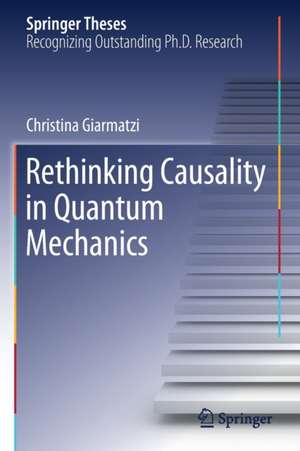Rethinking Causality in Quantum Mechanics: Springer Theses
Autor Christina Giarmatzien Limba Engleză Paperback – 4 noi 2020
| Toate formatele și edițiile | Preț | Express |
|---|---|---|
| Paperback (1) | 634.49 lei 6-8 săpt. | |
| Springer International Publishing – 4 noi 2020 | 634.49 lei 6-8 săpt. | |
| Hardback (1) | 640.71 lei 6-8 săpt. | |
| Springer International Publishing – 4 noi 2019 | 640.71 lei 6-8 săpt. |
Din seria Springer Theses
- 18%
 Preț: 997.88 lei
Preț: 997.88 lei -
 Preț: 389.88 lei
Preț: 389.88 lei - 15%
 Preț: 646.94 lei
Preț: 646.94 lei - 18%
 Preț: 943.43 lei
Preț: 943.43 lei -
 Preț: 399.29 lei
Preț: 399.29 lei - 18%
 Preț: 944.99 lei
Preț: 944.99 lei - 15%
 Preț: 636.80 lei
Preț: 636.80 lei - 18%
 Preț: 941.05 lei
Preț: 941.05 lei - 15%
 Preț: 643.16 lei
Preț: 643.16 lei - 15%
 Preț: 642.68 lei
Preț: 642.68 lei - 18%
 Preț: 1103.62 lei
Preț: 1103.62 lei - 20%
 Preț: 558.83 lei
Preț: 558.83 lei - 18%
 Preț: 1112.30 lei
Preț: 1112.30 lei - 18%
 Preț: 944.19 lei
Preț: 944.19 lei - 18%
 Preț: 1109.92 lei
Preț: 1109.92 lei - 18%
 Preț: 1217.27 lei
Preț: 1217.27 lei - 15%
 Preț: 640.06 lei
Preț: 640.06 lei - 15%
 Preț: 636.45 lei
Preț: 636.45 lei - 15%
 Preț: 640.06 lei
Preț: 640.06 lei - 15%
 Preț: 640.88 lei
Preț: 640.88 lei -
 Preț: 389.70 lei
Preț: 389.70 lei - 20%
 Preț: 563.91 lei
Preț: 563.91 lei -
 Preț: 393.35 lei
Preț: 393.35 lei - 15%
 Preț: 637.93 lei
Preț: 637.93 lei - 15%
 Preț: 641.85 lei
Preț: 641.85 lei - 18%
 Preț: 1225.94 lei
Preț: 1225.94 lei - 20%
 Preț: 551.36 lei
Preț: 551.36 lei - 18%
 Preț: 1229.10 lei
Preț: 1229.10 lei - 15%
 Preț: 639.25 lei
Preț: 639.25 lei - 18%
 Preț: 999.45 lei
Preț: 999.45 lei - 15%
 Preț: 640.06 lei
Preț: 640.06 lei - 18%
 Preț: 1220.45 lei
Preț: 1220.45 lei - 18%
 Preț: 1116.26 lei
Preț: 1116.26 lei - 18%
 Preț: 1110.72 lei
Preț: 1110.72 lei - 18%
 Preț: 1000.87 lei
Preț: 1000.87 lei - 18%
 Preț: 891.17 lei
Preț: 891.17 lei - 15%
 Preț: 640.06 lei
Preț: 640.06 lei - 5%
 Preț: 1154.07 lei
Preț: 1154.07 lei - 15%
 Preț: 635.96 lei
Preț: 635.96 lei - 15%
 Preț: 640.88 lei
Preț: 640.88 lei -
 Preț: 387.20 lei
Preț: 387.20 lei - 18%
 Preț: 1109.92 lei
Preț: 1109.92 lei -
 Preț: 385.25 lei
Preț: 385.25 lei -
 Preț: 385.25 lei
Preț: 385.25 lei - 18%
 Preț: 1112.30 lei
Preț: 1112.30 lei - 18%
 Preț: 999.45 lei
Preț: 999.45 lei -
 Preț: 386.99 lei
Preț: 386.99 lei - 15%
 Preț: 637.13 lei
Preț: 637.13 lei - 20%
 Preț: 554.21 lei
Preț: 554.21 lei - 20%
 Preț: 555.59 lei
Preț: 555.59 lei
Preț: 634.49 lei
Preț vechi: 746.47 lei
-15% Nou
Puncte Express: 952
Preț estimativ în valută:
121.42€ • 131.85$ • 101.100£
121.42€ • 131.85$ • 101.100£
Carte tipărită la comandă
Livrare economică 23 aprilie-07 mai
Preluare comenzi: 021 569.72.76
Specificații
ISBN-13: 9783030319328
ISBN-10: 3030319326
Pagini: 157
Ilustrații: XV, 157 p. 35 illus., 15 illus. in color.
Dimensiuni: 155 x 235 mm
Greutate: 0.25 kg
Ediția:1st ed. 2019
Editura: Springer International Publishing
Colecția Springer
Seria Springer Theses
Locul publicării:Cham, Switzerland
ISBN-10: 3030319326
Pagini: 157
Ilustrații: XV, 157 p. 35 illus., 15 illus. in color.
Dimensiuni: 155 x 235 mm
Greutate: 0.25 kg
Ediția:1st ed. 2019
Editura: Springer International Publishing
Colecția Springer
Seria Springer Theses
Locul publicării:Cham, Switzerland
Cuprins
Introduction.- Causal and causally separable processes.- Witnessing causal nonseparability: theory and experiment.- Causal polytopes.- Experimental test of a classical causal model for quantum correlations.- A quantum causal discovery algorithm.- Conclusions.
Notă biografică
Dr Giarmatzi obtained her Physics degree from Aristotle University of Thessaloniki, in Greece. After a short visit to rainy Paris for her Masters, and cloudy Brussels for an attempt at a PhD, she settled in sunny Brisbane, at The University of Queensland, for her PhD. Right after the thesis submission she remained at UQ, as a PostDoctoral Research Fellow until present. Having explored different theoretical aspects of quantum causality, now her interests lay in exploiting them to aid quantum technologies.
Textul de pe ultima copertă
Causality is central to understanding the mechanisms of nature: some event "A" is the cause of another event “B”. Surprisingly, causality does not follow this simple rule in quantum physics: due to to quantum superposition we might be led to believe that "A causes B” and that "B causes A”. This idea is not only important to the foundations of physics but also leads to practical advantages: a quantum circuit with such indefinite causality performs computationally better than one with definite causality. This thesis provides one of the first comprehensive introductions to quantum causality, and presents a number of advances.It provides an extension and generalization of a framework that enables us to study causality within quantum mechanics, thereby setting the stage for the rest of the work. This comprises: mathematical tools to define causality in terms of probabilities; computational tools to prove indefinite causality in an experiment; means to experimentally test particular causal structures; and finally an algorithm that detects the exact causal structure in an quantum experiment.
Caracteristici
Nominated as an outstanding Ph.D. thesis by the University of Queensland, Brisbane, Australia, One of the first comprehensive introductions to quantum causality In-depth description of concepts and methods Investigates quantum causality in theory and experiments
